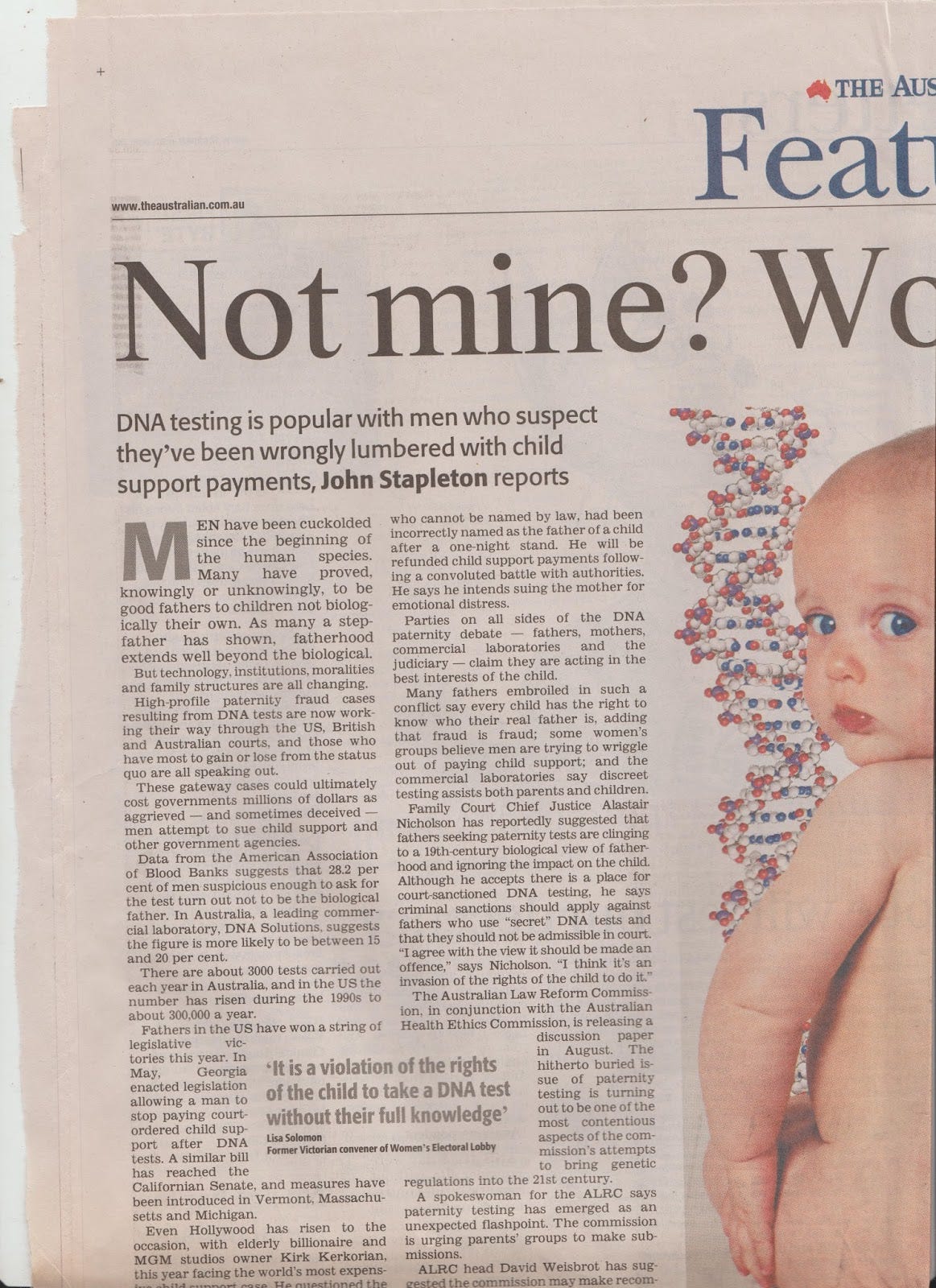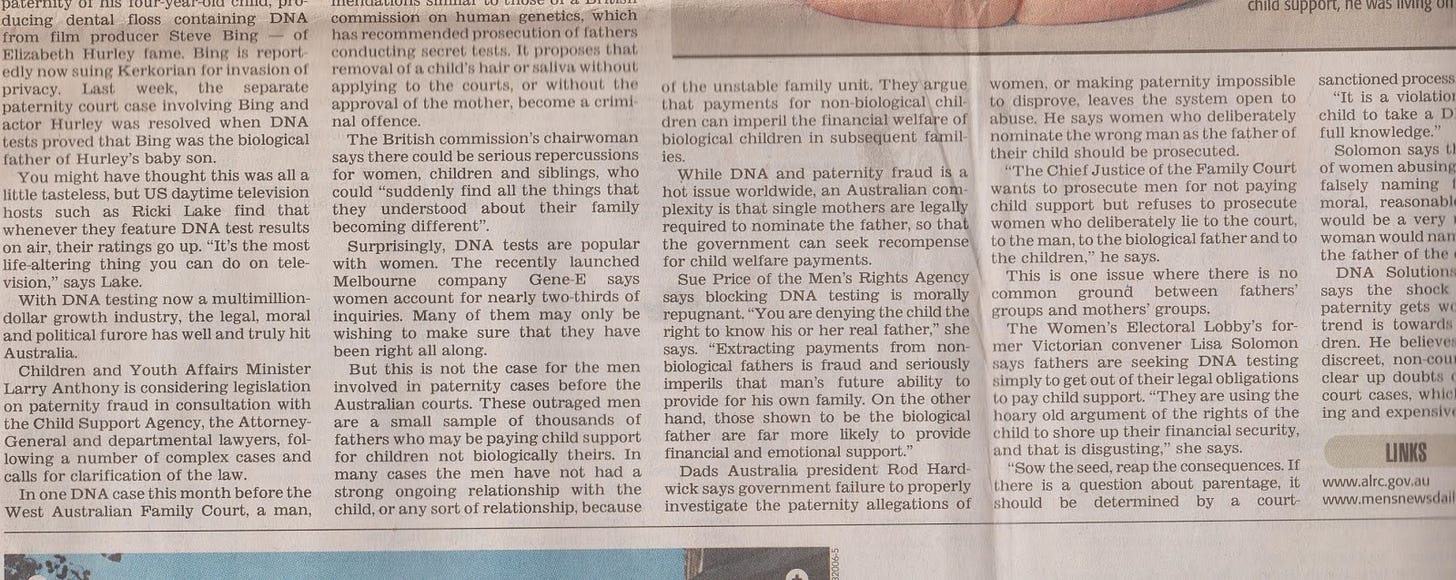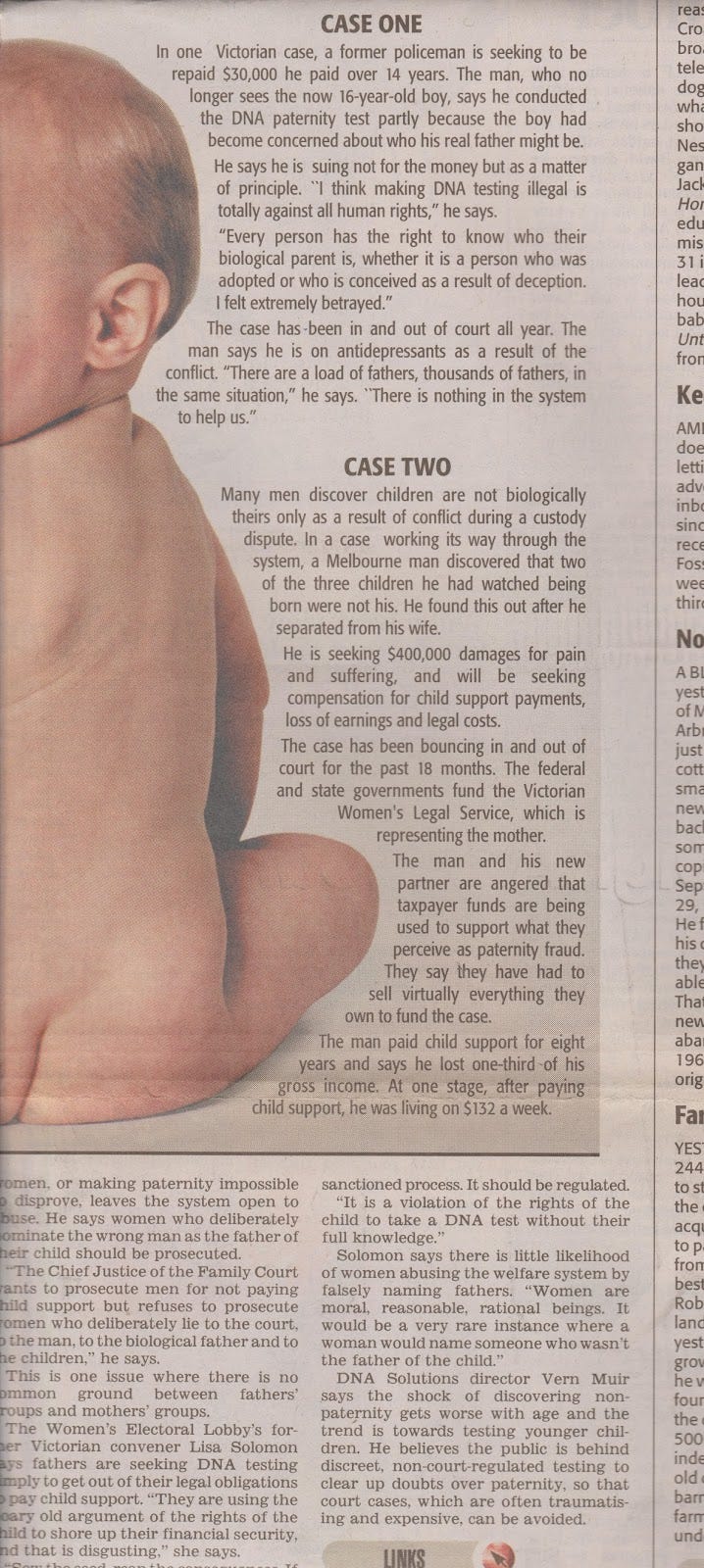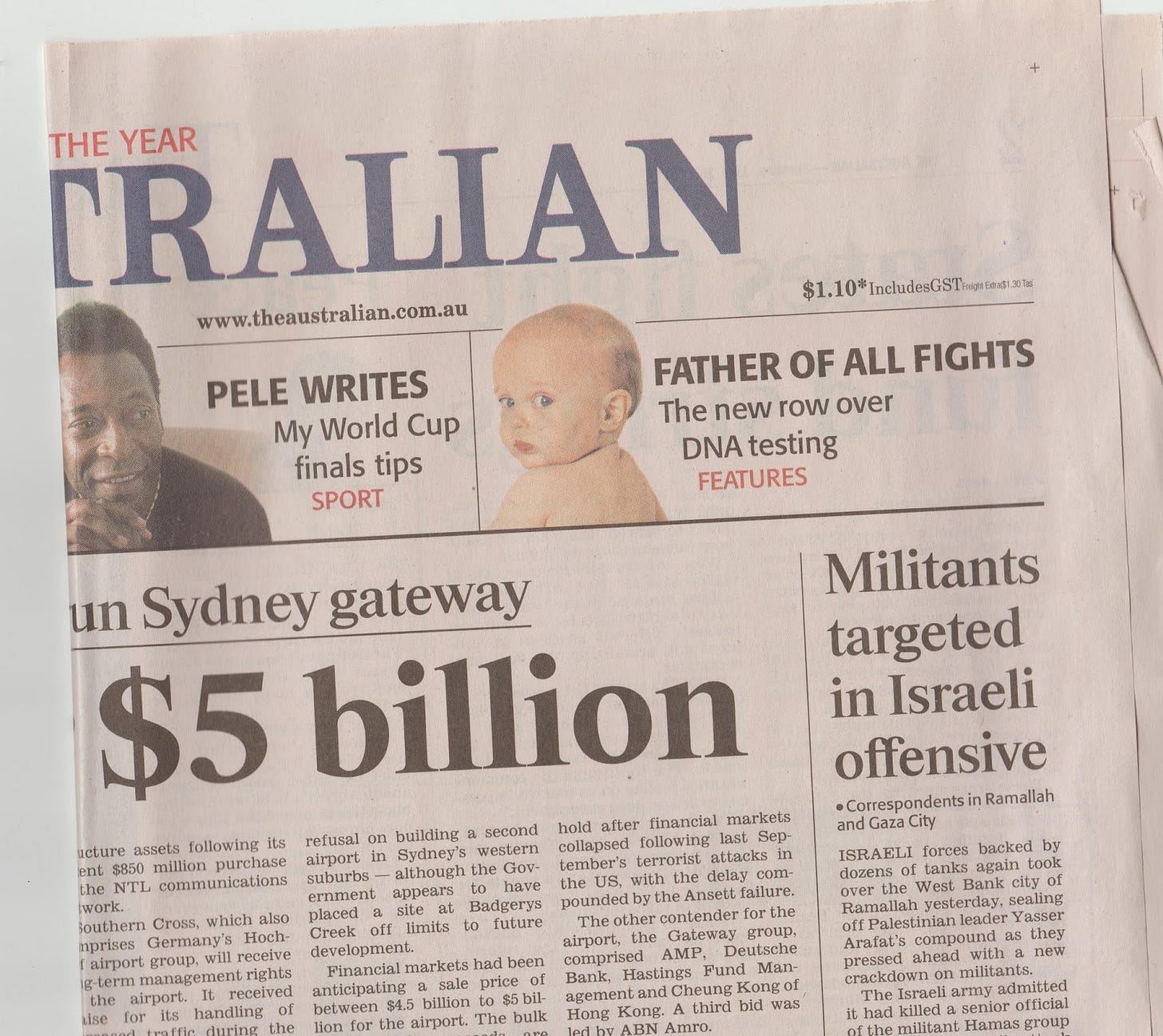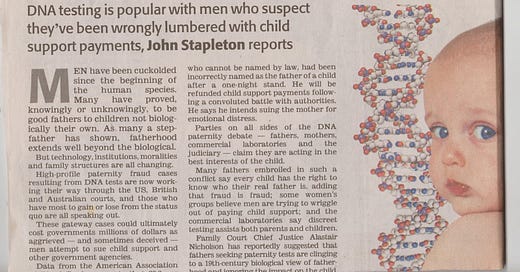Not Mine? Won't Pay! The Australian, 25 June 2002. Page One pointer.
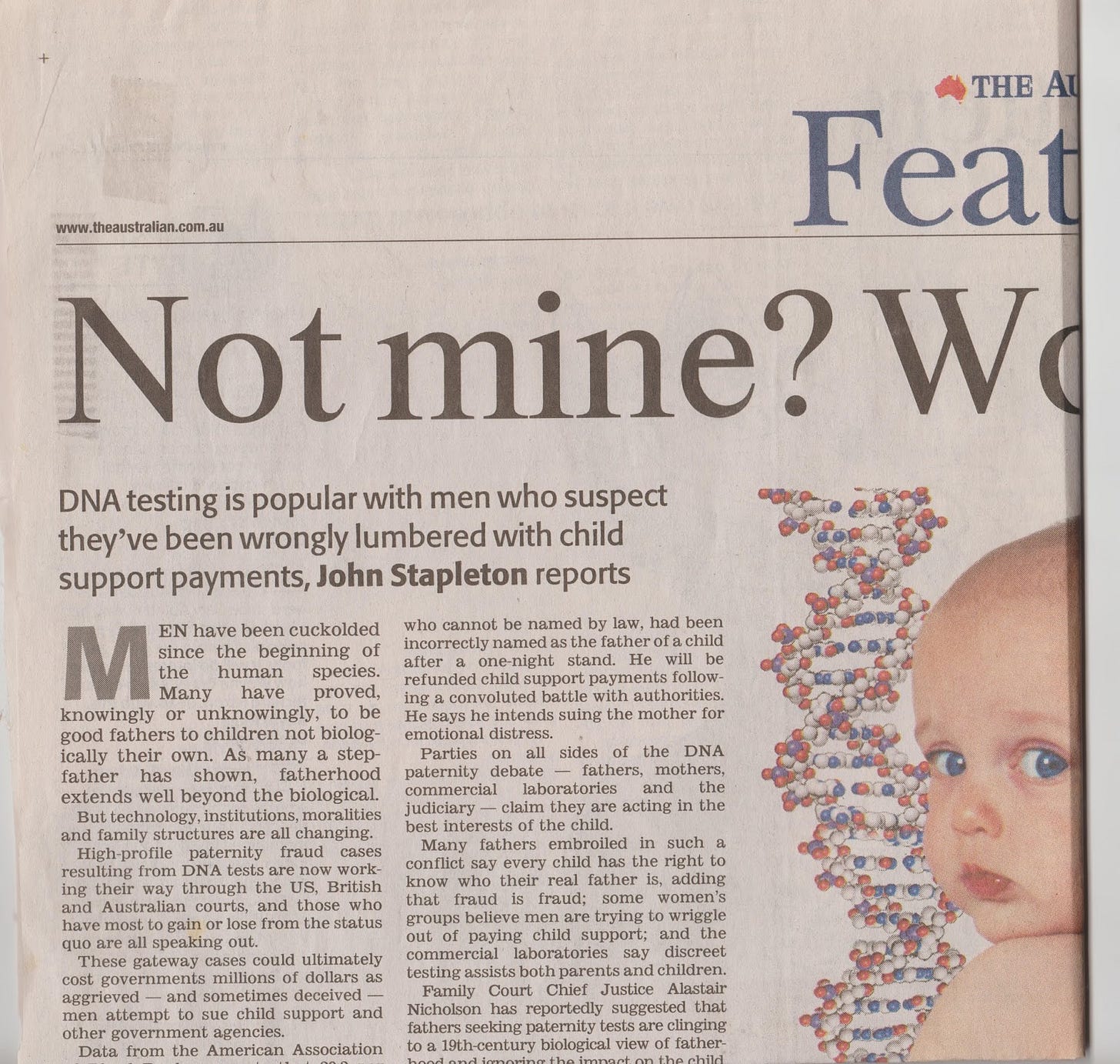
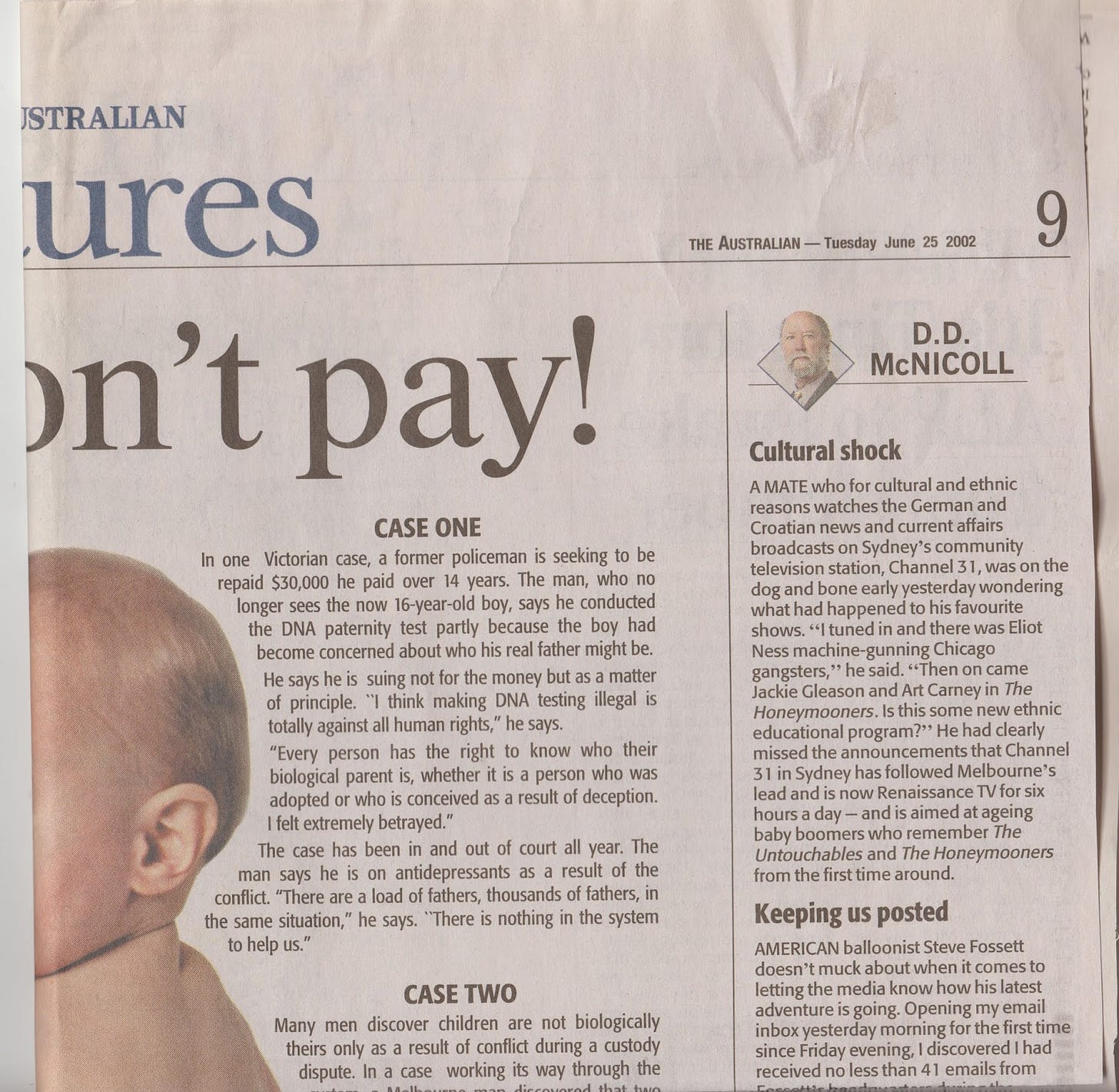
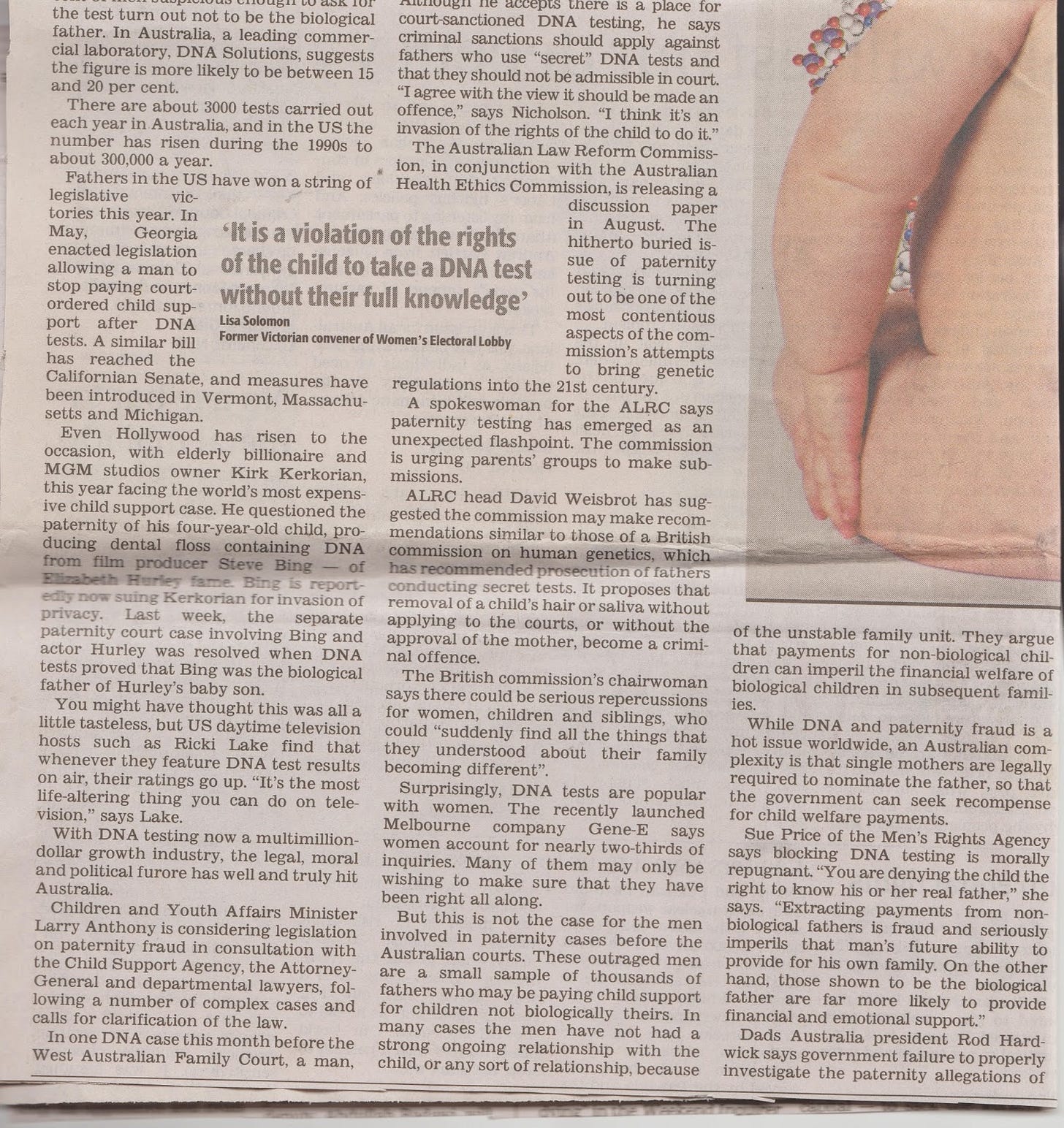

The Australian, Edition 1 TUE 25 JUN 2002, Page 009 Not mine? Won't pay!
By: John Stapleton
DNA testing is popular with men who suspect they've been wrongly lumbered with child support payments, John Stapleton reports
MEN have been cuckolded since the beginning of the human species. Many have proved, knowingly or unknowingly, to be good fathers to children not biologically their own. As many a stepfather has shown, fatherhood extends well beyond the biological.
But technology, institutions, moralities and family structures are all changing.
High-profile paternity fraud cases resulting from DNA tests are now working their way through the US, British and Australiancourts, and those who have most to gain or lose from the status quo are all speaking out.
These gateway cases could ultimately cost governments millions of dollars as aggrieved -- and sometimes deceived -- men attempt to sue child support and other government agencies.
Data from the American Association of Blood Banks suggests that 28.2 per cent of men suspicious enough to ask for the test turn out not to be the biological father. In Australia, a leading commercial laboratory, DNA Solutions, suggests the figure is more likely to be between 15 and 20 per cent.
There are about 3000 tests carried out each year in Australia, and in the US the number has risen during the 1990s to about 300,000 a year.
Fathers in the US have won a string of legislative victories this year. In May, Georgia enacted legislation allowing a man to stop paying court-ordered child support after DNA tests. A similar bill has reached the Californian Senate, and measures have been introduced in Vermont, Massachusetts and Michigan.
Even Hollywood has risen to the occasion, with elderly billionaire and MGM studios owner Kirk Kerkorian, this year facing the world's most expensive child support case. He questioned the paternity of his four-year-old child, producing dental floss containing DNA from film producer Steve Bing -- of Elizabeth Hurley fame. Bing is reportedly now suing Kerkorian for invasion of privacy. Last week, the separate paternity court case involving Bing and actor Hurley was resolved when DNA tests proved that Bing was the biological father of Hurley's baby son.
You might have thought this was all a little tasteless, but US daytime television hosts such as Ricki Lake find that whenever they feature DNA test results on air, their ratings go up. ``It's the most life-altering thing you can do on television,'' says Lake.
With DNA testing now a multimillion-dollar growth industry, the legal, moral and political furore has well and truly hit Australia.
Children and Youth Affairs Minister Larry Anthony is considering legislation on paternity fraud in consultation with the Child Support Agency, the Attorney-General and departmental lawyers, following a number of complex cases and calls for clarification of the law.
In one DNA case this month before the West Australian Family Court, a man, who cannot be named by law, had been incorrectly named as the father of a child after a one-night stand. He will be refunded child support payments following a convoluted battle with authorities. He says he intends suing the mother for emotional distress.
Parties on all sides of the DNA paternity debate -- fathers, mothers, commercial laboratories and the judiciary -- claim they are acting in the best interests of the child.
Many fathers embroiled in such a conflict say every child has the right to know who their real father is, adding that fraud is fraud; some women's groups believe men are trying to wriggle out of paying child support; and the commercial laboratories say discreet testing assists both parents and children.Family Court Chief Justice Alastair Nicholson has reportedly suggested that fathers seeking paternity tests are clinging to a 19th-century biological view of fatherhood and ignoring the impact on the child. Although he accepts there is a place for court-sanctioned DNA testing, he says criminal sanctions should apply against fathers who use ``secret'' DNA tests and that they should not be admissible in court. ``I agree with the view it should be made an offence,'' says Nicholson. ``I think it's an invasion of the rights of the child to do it.''
The Australian Law Reform Commission, in conjunction with the Australian Health Ethics Commission, is releasing a discussion paper in August. The hitherto buried issue of paternity testing is turning out to be one of the most contentious aspects of the commission's attempts to bring genetic regulations into the 21st century.
A spokeswoman for the ALRC says paternity testing has emerged as an unexpected flashpoint. The commission is urging parents' groups to make submissions.
ALRC head David Weisbrot has suggested the commission may make recommendations similar to those of a British commission on human genetics, which has recommended prosecution of fathers conducting secret tests. It proposes that removal of a child's hair or saliva without applying to the courts, or without the approval of the mother, become a criminal offence.
The British commission's chairwoman says there could be serious repercussions for women, children and siblings, who could ``suddenly find all the things that they understood about their family becoming different''.
Surprisingly, DNA tests are popular with women. The recently launched Melbourne company Gene-E says women account for nearly two-thirds of inquiries. Many of them may only be wishing to make sure that they have been right all along.
But this is not the case for the men involved in paternity cases before the Australian courts. These outraged men are a small sample of thousands of fathers who may be paying child support for children not biologically theirs. In many cases the men have not had a strong ongoing relationship with the child, or any sort of relationship, because of the unstable family unit. They argue that payments for non-biological children can imperil the financial welfare of biological children in subsequent families.
While DNA and paternity fraud is a hot issue worldwide, an Australian complexity is that single mothers are legally required to nominate the father, so that the government can seek recompense for child welfare payments.
Sue Price of the Men's Rights Agency says blocking DNA testing is morally repugnant. ``You are denying the child the right to know his or her real father,'' she says. ``Extracting payments from non-biological fathers is fraud and seriously imperils that man's future ability to provide for his own family. On the other hand, those shown to be the biological father are far more likely to provide financial and emotional support.''
Dads Australia president Rod Hardwick says government failure to properly investigate the paternity allegations of women, or making paternity impossible to disprove, leaves the system open to abuse. He says women who deliberately nominate the wrong man as the father of their child should be prosecuted.
``The Chief Justice of the Family Court wants to prosecute men for not paying child support but refuses to prosecute women who deliberately lie to the court, to the man, to the biological father and to the children,'' he says.
This is one issue where there is no common ground between fathers' groups and mothers' groups.
The Women's Electoral Lobby's former Victorian convener Lisa Solomon says fathers are seeking DNA testing simply to get out of their legal obligations to pay child support. ``They are using the hoary old argument of the rights of the child to shore up their financial security, and that is disgusting,'' she says.
``Sow the seed, reap the consequences. If there is a question about parentage, it should be determined by a court-sanctioned process. It should be regulated.
``It is a violation of the rights of the child to take a DNA test without their full knowledge.''
Solomon says there is little likelihood of women abusing the welfare system by falsely naming fathers. ``Women are moral, reasonable, rational beings. It would be a very rare instance where a woman would name someone who wasn't the father of the child.''
DNA Solutions director Vern Muir says the shock of discovering non-paternity gets worse with age and the trend is towards testing younger children. He believes the public is behind discreet, non-court-regulated testing to clear up doubts over paternity, so that court cases, which are often traumatising and expensive, can be avoided.
LINKS
CASE ONE
In one Victorian case, a former policeman is seeking to be repaid $30,000 he paid over 14 years. The man, who no longer sees the now 16-year-old boy, says he conducted the DNA paternity test partly because the boy had become concerned about who his real father might be.
He says he is suing not for the money but as a matter of principle. ``I think making DNA testing illegal is totally against all human rights," he says.
"Every person has the right to know who their biological parent is, whether it is a person who was adopted or who is conceived as a result of deception. I felt extremely betrayed."
The case has been in and out of court all year. The man says he is on antidepressants as a result of the conflict. "There are a load of fathers, thousands of fathers, in the same situation," he says. ``There is nothing in the system to help us."
CASE TWO
Many men discover children are not biologically theirs only as a result of conflict during a custody dispute. In a case working its way through the system, a Melbourne man discovered that two of the three children he had watched being born were not his. He found this out after he separated from his wife.
He is seeking $400,000 damages for pain and suffering, and will be seeking compensation for child support payments, loss of earnings and legal costs.
The case has been bouncing in and out of court for the past 18 months. The federal and state governments fund the Victorian Women's Legal Service, which is representing the mother.
The man and his new partner are angered that taxpayer funds are being used to support what they perceive as paternity fraud.
They say they have had to sell virtually everything they own to fund the case.
The man paid child support for eight years and says he lost one-third of his gross income. At one stage, after paying child support, he was living on $132 a week.
Illus: Photo
Section: FEATURES
Type: FeatureAUS-20020625-1-009-4329542V1
